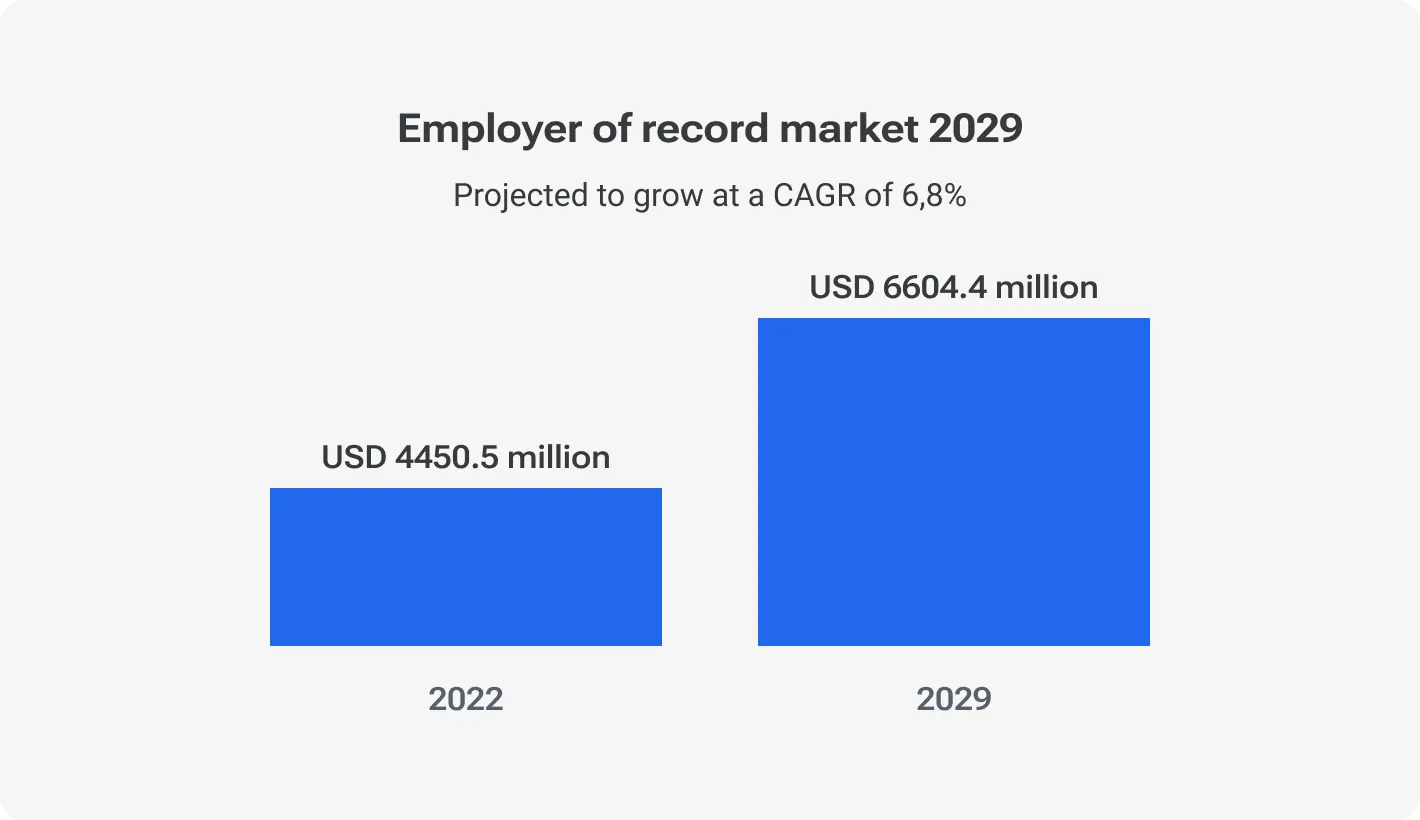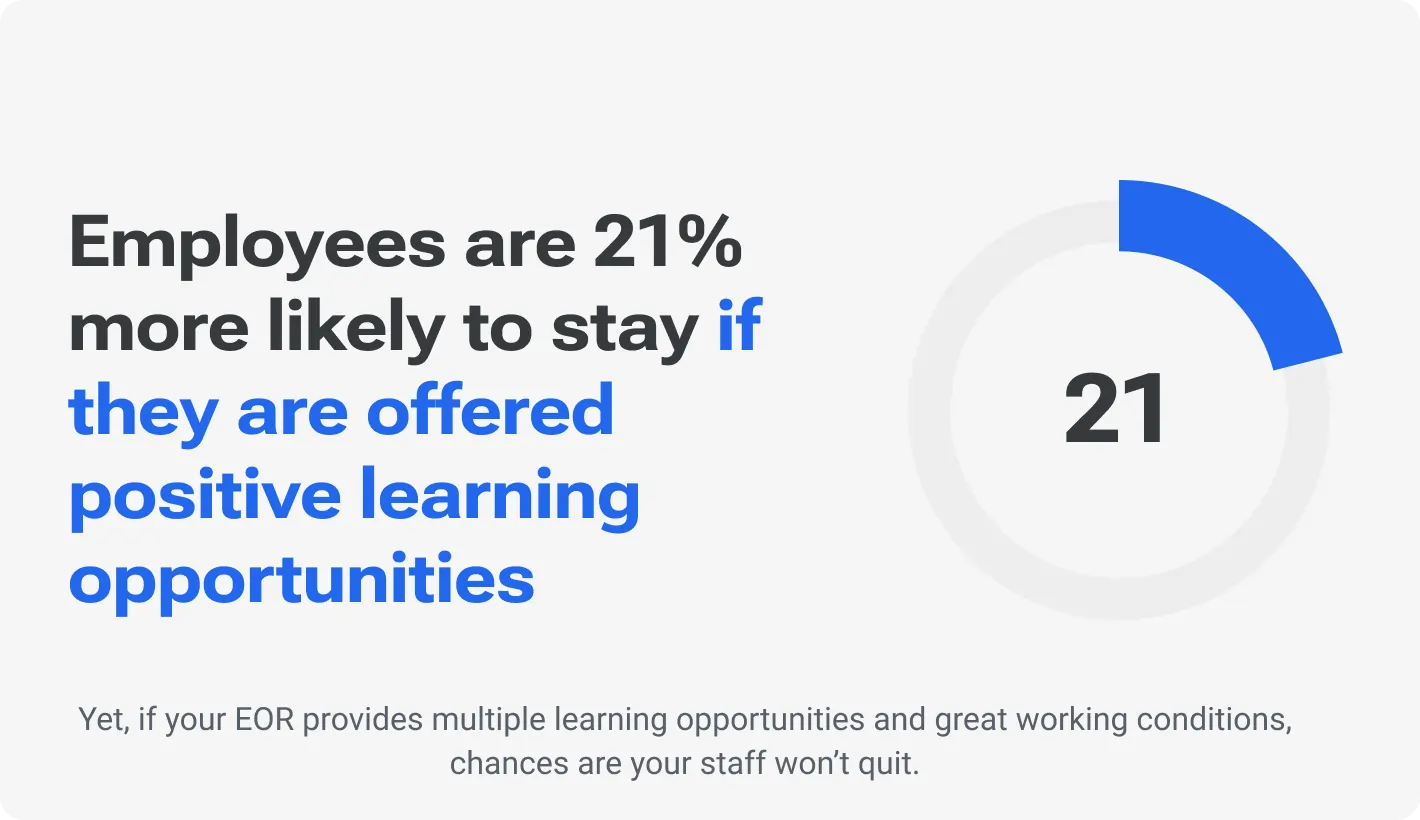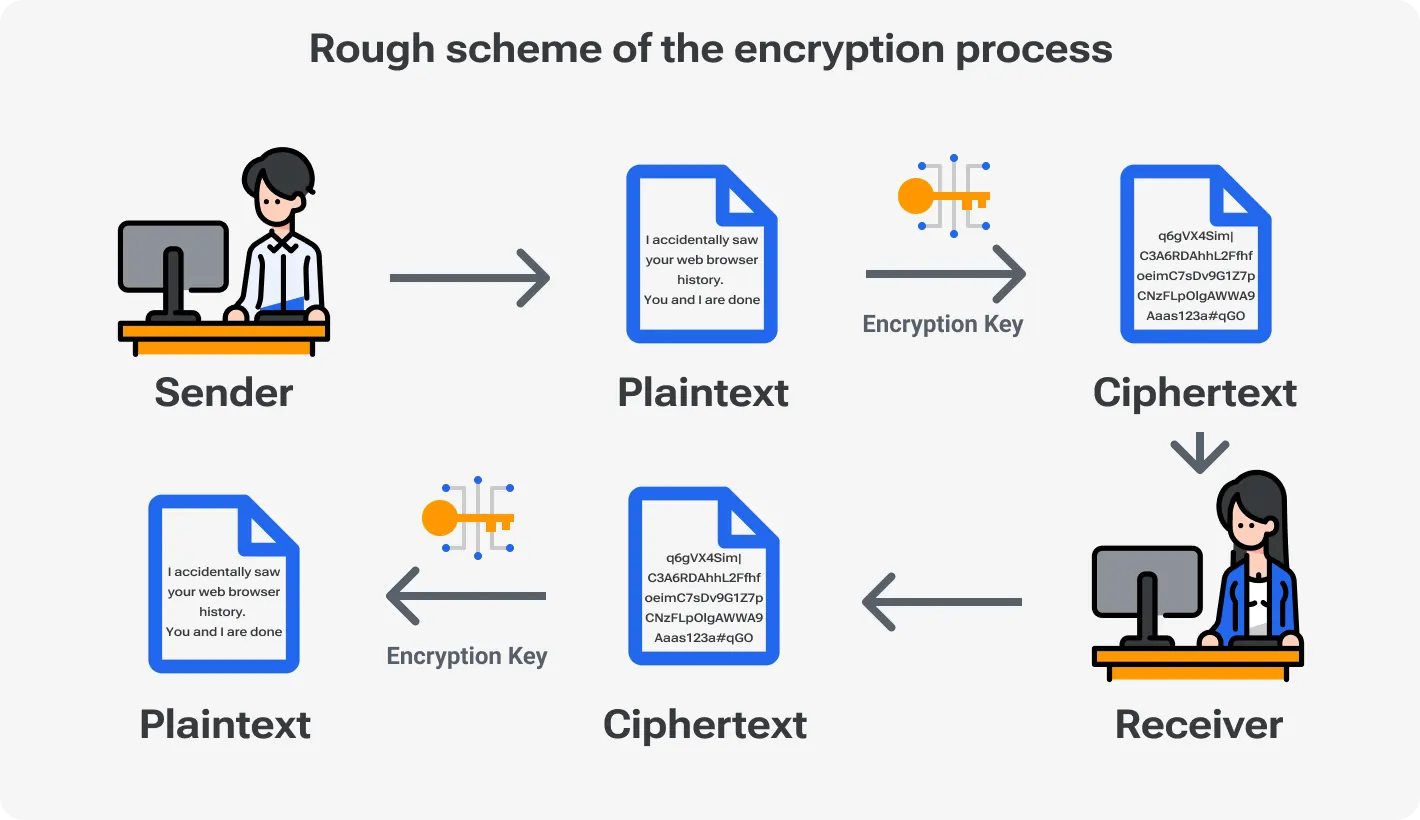Using an employer of record model can significantly streamline entering new markets. There are no guarantees since an expansion hinges on many factors. Nevertheless, there are statistics and numerous successful cases.
Eucalyptus, a digital-experience tech company, utilized EOR services to manage its international workforce — one of those great employment record examples. And it was really successful, hands down, since Eucalyptus saved 15% on global hiring costs. They chose this “EOR way” to bypass the complexities of setting up local entities and managing international compliance and payroll.
Take also Canva, the popular online design platform, for another proof. As their user base exploded globally, they saw a golden opportunity to expand their customer support team. Setting up shop in various countries to directly hire talent wasn't ideal. That's when they understood what the employer of record was.
An EOR is like your international hiring wingman. They handle all the nitty-gritty employment legalities in the countries you want to hire from so you can focus on building your dream team. Like having a local P.O. Box for your new hires — they get paid through the EOR's system, but you call the shots when it comes to work assignments, performance, and company culture.
Cost efficiency through reduced overhead associated with international expansions, risk mitigation in compliance and legalities, and streamlined global payroll and HR processes. These advantages make the EOR model an attractive solution for businesses starving for growth.
Do you need to quickly hire global IT talent, but setting up a legal entity abroad is costly, complex, and could impact your tax status?
If you still hesitate, that’s completely understandable since this is, probably, one of the first articles you came across here. Then, run through these 10 guiding questions on how to choose a reliable EOR partner.
10 key questions to consider when choosing an EOR partner
Selecting the right Employer of Record (EOR) partner is crucial for your international business success. Here are the first five questions to guide your decision-making process, complete with key considerations for each.
1. What is the EOR’s expertise in the specific countries where you plan to expand?
Since there are no equal and identical employers on record. That’s why it’s crucial to ensure your potential partner has robust local knowledge and a strong presence in the country (-ies) you're targeting. For example, the EOR should be well-versed in German labor laws, social security processes, and tax regulations if expanding to Germany.
Take termination issues as an example. For a termination notice to actually count, there’s going to be solid proof it was delivered. It’s all about having that piece of paper, signed, sealed, and delivered by both sides. Or, if it’s more your style, having someone around to witness the handover works too. Just making sure everyone’s on the same page and there’s no "he said, she said" later on. A seasoned EOR with country-specific expertise can significantly reduce compliance risks.
Why it matters: In-country expertise minimizes the risk of compliance errors and ensures a smooth onboarding experience for your new hires. Imagine you're a California-based tech startup looking to hire developers in Berlin. You'll want an EOR who knows the ins and outs of the German employment landscape, including those termination moments and is familiar with intricacies like co-determination laws and social security contributions.
Action tip: Ask the EOR for references from companies that have used their services in your target countries. Speaking to satisfied clients can provide valuable insights.
2. How transparent is the EOR with their pricing structure?
If an EOR is beating around the bush, chances are they have sophisticated pricing schemes. Instead of diving into these intricacies, look for an EOR that offers clear, upfront information about its fees. We understand that easier said than done: saying something like “Avoid providers with hidden charges or complex pricing models” doesn’t break new ground, right?
For this reason, there is a pretty simple “double-check trick” — if they have an extended employer of record agreement including many nuanced cases, they are likely worth your trust. Some EORs offer a flat fee per employee, which simplifies budgeting, while others might charge additional fees for setup, payroll processing, or termination.
Two key considerations for choosing:
-
Fee models: Most EORs offer different fee structures, such as flat monthly fees, percentage-based fees, or hybrid models. Outline your needs and just choose the model that best suits them.
-
Additional costs: Ask about potential additional costs beyond the base fee, such as onboarding charges, statutory benefits administration, or currency exchange fees.
The National Association of Professional Employer Organizations (NAPEO) once found that surveyed businesses mostly reported unforeseen costs as a major pain point when working with EORs. Despite using similar hiring strategies (like PEO, for example) saves at least 27% of your budget. Clear pricing upfront avoids surprises down the line.
Action tip: Check the agreement mentioned above. Request a detailed quote from the EOR that outlines all associated fees and charges.
3. Can the EOR handle the scale of your hiring needs?
There's no point in starting a business if you're not thinking about growing it, right? Whether you're a small startup looking for your first remote hire or a large corporation planning a global expansion, you could do with scalability.
Assess whether the EOR can support your current and future hiring plans. If you anticipate rapid growth, the EOR should be able to scale operations accordingly. For instance, an EOR that manages to onboard 10 to 20 employees within a month for a tech startup provides a good benchmark of scalable capabilities.
Moreover, according to the CFO of Globalization Partners, it takes up to 12 months on average just to establish a foothold.
Why it matters: Imagine: you successfully entered an Asian market with a new SaaS product. But your success was too rapid, and you weren’t ready for such demand. Now, you need more staff, at least for customer support, who know the nuts and bolts of the local market. Yet, your EOR just can't scale as fast as your product gains ground. This inevitably will lead to bottlenecks and hinder your expansion plans.
Action Tip: Discuss your hiring projections with the EOR and inquire about their experience managing similar-sized teams in your target countries. Like in the example above, if you're a rapidly growing SaaS company anticipating hiring dozens of designers or engineers (for example) across the globe, you'll need an EOR with a proven track record of handling high-volume recruitment and onboarding processes.
4. What is the EOR’s track record for compliance and reliability?
Investigate the EOR’s history with compliance in employment and tax laws. A good EOR will have a clean track record with no legal penalties or compliance issues. Request case studies or references to verify their reliability. For example, a reliable choice can be an EOR that has successfully navigated complex tax regulations in multiple jurisdictions without facing fines.
Among other valuable information in the Forbes article, there is Globalization partners’ CFO citation, “42% of companies experienced compliance challenges during their initial global expansion”. The right EOR mitigates these risks.
Action Tip: Request the EOR's compliance certifications and ask specific questions about their experience handling complex payroll and tax situations in your target countries.
5. How comprehensive are the EOR’s service offerings?
Does your potential EOR provide a full suite of services that cover all aspects of employment, from payroll and tax processing to benefits administration and legal compliance? If yes, this ensures you don’t need to manage multiple vendors for different aspects of employee management. An EOR that offers added services like immigration support or employee relocation can provide additional value.
So, look beyond basic payroll processing and consider additional offerings that can enhance your overall experience:
Onboarding and visa assistance
Time and attendance tracking
Cultural training resources
Why it matters: A comprehensive EOR becomes a one-stop shop for your global hiring needs, saving you time and resources.
Action tip: Compare the service offerings of different EOR providers. Unfortunately, there is no single and ideal tool for instant comparison, and you need to gather information yourself. Yet, you can choose the one that best aligns with your specific requirements.
Everything you need to know about the employer of record model.
6. What level of technology integration does the EOR offer and how does the employer of record agreement work?
Check if the EOR uses modern technology platforms that integrate easily with your existing HR systems. Tools like ADP or Paychex for payroll processing, and HRIS systems like BambooHR, are good benchmarks for efficient technology use. An EOR that leverages such technologies can significantly streamline operations, making employee management smoother across different countries.
An additional word is about transparency. Trust us, it’s crucial in any employment relationship. We already mentioned clear and standardized employment contracts. Make sure these contracts outline the terms of employment:
Compensation and benefits
Work hours and vacation time
Action tip: Find a free sample employment contract from different reputable EORs, request the same from your potential partner, compare and have your legal team review it to ensure it aligns with your company's policies and local regulations. Explore some valuable resources to find out specific requirements:
-
International Labour Organization (ILO)
-
U.S. Department of Labor (with a focus on international resources)
7. What are the employment models they use in each country?
Employment models can vary depending on location. Some EORs offer a Professional Employer Organization (PEO) model, where they co-employ your workers. Others utilize an employer of record (EOR) model, acting as the sole employer.
Why it matters: When you know the nuances of the employment model used in each country, it’s much easier to deal with tax implications and employer liability.
Action Tip: Book a meeting with an employer of record provider to discuss the specific employment models the partner uses in your target countries and inquire about the implications for your business. For instance, the PEO model might be ideal if you desire more control over the employer-employee relationship, while the EOR model provides greater administrative simplicity and simply frees more of your time.
8. How will the EOR help you if you need to end an employment agreement?
Even the best-laid plans can change. Understanding the EOR's termination process for remote employees is essential.
Nota bene:
Notice periods: Local regulations often dictate minimum notice periods required for termination. The EOR should guide you through the legalities.
Severance packages: Depending on the location and employment contract, severance packages might be necessary. Also, your EOR must be aware of the fact that it's possible to negotiate an employee’s severance package. Despite negotiating and implementing severance packages usually involving complex legal considerations and may be difficult to pull off, EOR should warn you of potential pitfalls and difficulties to avoid finding yourself in hot water.
Many companies experienced challenges during the termination process for international employees. The skilled and seasoned EOR services provider will help minimize these challenges.
Yet, if your EOR provides multiple learning opportunities and great working conditions, chances are your staff won’t quit.
Action tip: Ask the EOR to explain their termination procedures in detail and inquire about any associated costs.
9. How is payroll data managed, and do you have an overview?
Transparency and accessibility are key. An ideal option is the secure online portal where you can access real-time payroll information for your remote team. With increasing concerns around data breaches and privacy issues, ensure the EOR adheres to stringent data protection standards like GDPR for European operations, or CCPA in California.
Use SecureWorks or Symantec to check if a potential partner is committed to security. Verify their security certifications and policies to ensure your employees' data remains protected.
Why it matters: Having a clear overview of payroll data allows you to monitor costs, ensure accuracy, and comply with tax reporting requirements.
Action tip: Inquire about EOR’s payroll data management system and access protocols. Ensure the system is user-friendly (simply to check if it’s up-to-date) and secure (the main goal for examination).
10. How do they store and keep that data safe?
The EOR should have robust data security measures in place to protect your sensitive payroll and employee information.
Nota bene:
Data encryption: The EOR's data storage systems should use industry-standard encryption protocols to safeguard sensitive data.
Data breach protocols: Ask about the partner's data breach response plan in case of a security incident.
Rough scheme of the encryption process
Action tip: Ask their data security practices and ensure they comply with relevant data privacy regulations, such as GDPR (General Data Protection Regulation) in the European Union and those we mentioned under the previous sub-header.
To sum it up
A reliable EOR streamlines your international hiring process, ensures compliance with local regulations, and allows you to zero in on what matters most for you – whether it is building an A-class team or smooth internal processes.
Devico is a trusted employer of record provider that specializes in providing tailored EOR solutions. We dive into your goals, understanding of an ideal corporate culture, current challenges, and vision — and work our fingers to the bones to ensure your expansion is smooth and faster than your competitors’.
Ukraine’s tech market wasn’t stopped even by the war. Moreover, local developers and non-tech specialists took over international recognition. And Devico knows the ropes in handling local hiring.
Still not convinced? Well, we are here not to force you. Yet, companies using EOR services experience a significant reduction in time-to-hire for international talent. Usually, this process takes at least 44 days. EOR makes it faster.
Aberdeen Group found that EOR partnerships can save you at least 20% on international payroll and HR administration. This is the least number, usually it’s more significant.
Still, without any push, contact us for a free consultation to discuss how our EOR solutions can streamline your international workforce management.
Want to know how your business may benefit from EOR?






